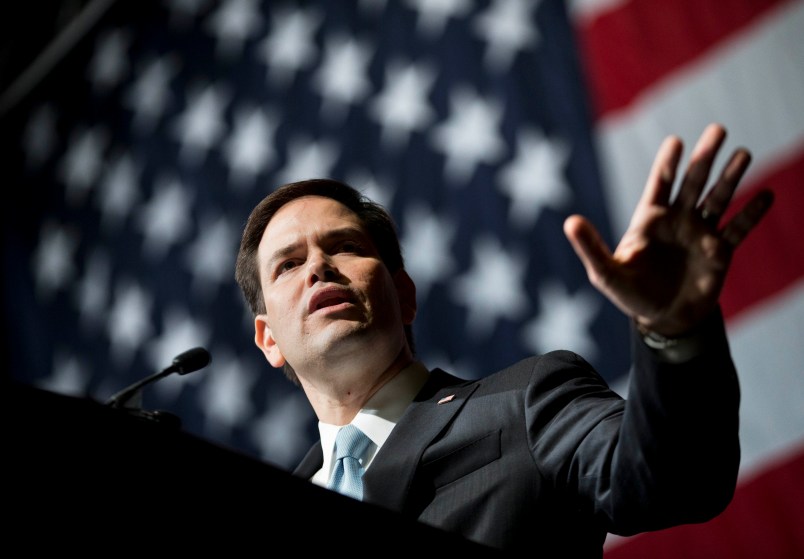For one reason or another, it’s become a foreign policy stage on the early path to the 2016 election. Is Marco Rubio an empty tough-talker who happens to be smarter than his vacuous competitors? Or is he a now an elite voice on international relations? Or is he a klutz whose unwillingness to call out the mistakes of earlier Republicans on the Iraq War chained him to their errors?
And for all the sparky coverage of the supposed foreign policy differences between Rubio, Jeb Bush, Scott Walker, and the others, goodness, it’s been a narrow conversation akin to a game show: “Whose Iraq War was it, anyway?”
For some time—and certainly since 9/11 gave George W. Bush an international mandate to squander—the dominant strain in U.S. foreign policy discourse has been a series of variations on the old line: “When all you’ve got is a hammer, everything looks like a nail.” With a few exceptions, and a few breaks in the action, there’s been pretty steady bipartisan zeal for seeing the world and our place in it in embarrassingly simplistic terms. The specific application of this worldview follows a ludicrously simple equation: “Here is a bad thing happening in another country” + “We have a large military” = “We have a solution.”
Thus far, everything we’re getting from the 2016 field suggests that this is the basic logic shaping most of current candidates’ worldviews. It’s pretty much been “American Strength” and “round up a posse to throw our weight around … wherever we might need to.”
The Obama Administration exists in part as a response to the most spectacular failures of this way of thinking, but it has only been able to marginally stem the tide. Think of the various military actions Obama has been called to undertake while in office. He’s been urged to consider sending troops to Iraq (frequently and for myriad reasons), Afghanistan, Ukraine (see also), Yemen, Iran, Nigeria, Libya, Pakistan, Syria, Israel-Palestine, and a handful of other places (like Mexico). It’s a mark of the stability of American faith in the constructive, rehabilitative power of American bullets that each administration decision to forego military adventuring has added voices to the crowd that sees Obama as weak or inconsistent on foreign policy. Hesitation and reflection with violence are still not in vogue in the politics of American foreign policy.
But others, none better than Vanderbilt law professor Ganesh Sitaraman (full disclosure: a friend of mine), have argued persuasively that Obama’s selective application of military force is much more coherent than commonly recognized. In a piece for The American Interest last year, Sitaraman wrote:
[Obama’s] approach can best be described as progressive pragmatism … attentive to the practical costs and risks of action abroad, including the financial costs to the Treasury, the possibility of backlash, and the likelihood of unintended consequences, whether directly in the country at issue or around the world. Their recognition of the limits of knowledge makes them inherently leery of abstract visions of the future, and of imaginative attempts to redesign the world from a distance. Skepticism does not mean inaction, but it does produce a sharp razor for distinguishing between America’s needs and its desires.
That is, American violence can accomplish some things, in some situations, but it is far from an answer to all or even most challenges that the country faces internationally. Further, our capacity to inflict violence is best understood in terms of power, rather than values. That is, missiles cannot a democracy create, no matter how pure our intentions. Tanks cannot end ethnic hatred. Drone strikes are incapable of winning hearts or minds (and the administration’s dependence on these is an exception to their generally cautious rule).
Outside Bernie Sanders’ campaign, the 2016 field evinces none of this humility about the practical and moral limits of violence. And what of the Democrats? Is Hillary Clinton best understood as a fellow traveler who would continue the foreign policy approach of the administration she served as Secretary of State? Or as a hawk who pushed for one of the exceptions to that rule: an intervention in Libya that has proven to be one of that administration’s less successful decisions?
Obama’s oft-quoted “don’t do stupid stuff” approach to foreign policy may not be “an organizing principle” for a nation with extraordinary lethal capacity. But it’s not meant to be. It’s better understood as a disposition. It’s better read as an admission that the world is morally complex and that deadly force always implicates its wielder in some degree of guilt. As in all complicated matters, of course, pragmatic caution is not an inoculation against every error. Humans still screw up. Stupid stuff gets done. Which is why it pays to be especially ponderous when making decisions about the use of large, explosive weaponry. It’s not flashy to wind down wars. Restraint is no competition for dramatic aggression and (false) glory. Unfortunately, while the 2016 election hasn’t really started, early returns suggest that this brand of thinking might leave the White House with President Obama.
Conor P. Williams, PhD is a Senior Researcher in New America’s Education Policy Program. Follow him on Twitter @conorpwilliams. Follow him on Facebook.







Does the writer simply need the money? Or is he attempting to show the rhetorical dazzle of the empty question?
We report, you decide.
It’s journalism as performance art. Are you not entertained?
Simplicity and Arrogance is the POINT!
It is all their target audience understands.
Anything else is just “Elitist East-Coast, Pointy-headed Lib’ruls” and is rejected out of hand.
Or as their hero once said: “It’s HARD”.
Ooooooooooo, I see it’s time to play the “Both Sides Do It” game.
The author must be a Washington insider. I guess it is a think piece for people who don’t think.